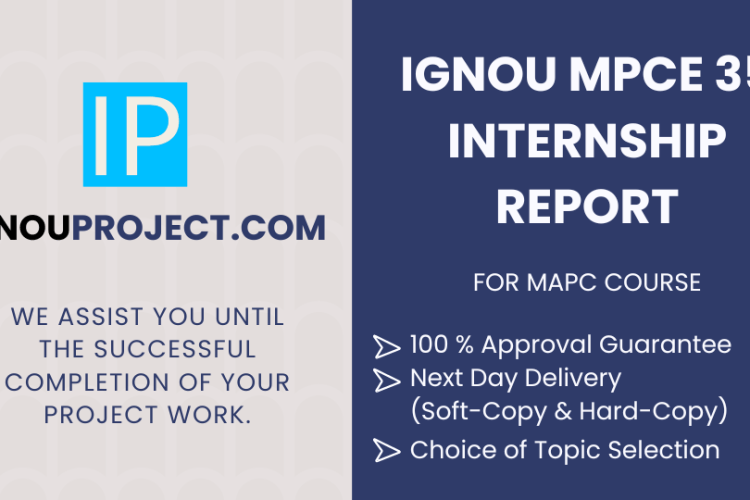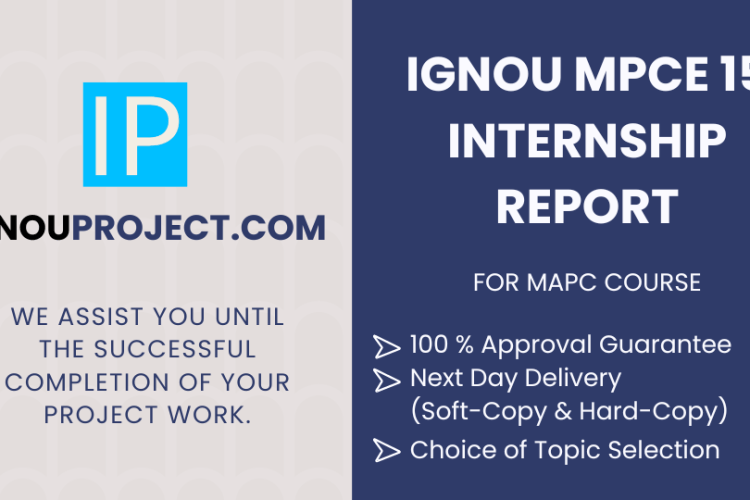
Overview of the IGNOU MPCE 25 Internship Report
After finishing their internship, students must turn in the IGNOU MPCE 25 Internship Report, which is a long record. The student’s experiences, learning, and notes during their internship are shown in this report, which is part of the Master’s Degree Program in Psychology. You can either print out or hand-write the IGNOU MPCE 25 Internship Report. The data can be hand-typed in as well as written out on paper for the psychological tests and case histories.
Whatsapp us to get the Personalized (Customized) IGNOU MPCE 25 Internship Report
Download link for IGNOU MPCE 25 Internship Report
The learner should write by hand the case report, notes, and suggested interventions. The student should also write down what they do every day at the agency or group where they are doing their MPCE 25 Internship Report. The learner should also include the agency supervisor’s consent letter (Appendix III) with the job report.
How is the IGNOU MPCE 25 Internship Report evaluated?
The evaluation of the MPCE 25 Internship Report in the IGNOU psychology program involves assessing various components to ensure that the report comprehensively covers the student’s experiences, learning’s, and reflections during their internship.
Content and Structure
- Completeness: Whether the report includes all required sections such as the introduction, description of the work setting, learning experiences, challenges and solutions, case studies or project descriptions, reflections, and conclusion.
- Organization: How well the report is organized, including logical flow, coherence, and the effective use of headings and subheadings.
Quality of Analysis and Reflection
- Depth of Reflection: The extent to which the student engages in deep reflection about their learning and experiences, including insights into personal and professional growth.
- Application of Psychological Theories: How effectively the student applies psychological theories and concepts learned during their course to their internship experiences.
- Critical Thinking: The ability to analyze experiences critically, including evaluating what was learned, understanding challenges, and proposing thoughtful solutions or improvements.
Professional and Ethical Considerations
- Confidentiality: Adherence to ethical standards, especially concerning confidentiality and privacy of the clients and the organization.
- Professionalism: The degree to which the student demonstrates professional behavior and attitudes in their work and writing.
Writing Quality
- Clarity and Coherence: The clarity of the writing, including how easily the reader can understand the experiences and analyses presented.
- Grammar and Spelling: The correctness of grammar, spelling, and punctuation.
- Adherence to Guidelines: Following specific formatting and citation guidelines provided by IGNOU or the department, such as font size, line spacing, and referencing style.
Use of Evidence
- Supporting Documentation: The inclusion of relevant supporting evidence, such as graphs, tables, images, or appendices that enhances the report’s depth and credibility.
- Citation of Sources: Proper citation of any external sources of information, theories, or concepts according to the prescribed academic style.
- Process of evaluation: A faculty member or a supervisor who is knowledgeable about psychology and is familiar with the goals of the internship program typically evaluates the report. The evaluator may use a rubric or scoring guide that aligns with the aforementioned criteria to provide a structured and fair assessment of the report.
- Feedback and Grades: After evaluation, students usually receive feedback highlighting strengths and areas for improvement. Depending on the institution’s policies, the report may contribute to a final grade for the internship component of the course. In some cases, if the report does not meet the required standards, students may be asked to revise and resubmit it.
What resources are available to help you with your IGNOU MPCE 25 Internship Report?
Some resources that can help you are:
- IGNOU Study Materials: Go over course materials that have to do with professional psychology work.
- University Writing Center: A lot of colleges have services to help students with their writing that can help with style, structure, and proofreading.
- Online Resources: Purdue OWL and other websites like it have great tips on how to write, format, and cite.
- People managing and peers: Don’t be afraid to ask your internship supervisor, teacher advisor, or classmates for comments.
What happens after you submit your IGNOU MPCE 25 Internship Report?
- Receipt Acknowledgement: Depending on how you sent your report, you may get an automatic response right away (if you sent it online) or a handwritten response from the department or your boss letting you know they got it.
- Initial Check: First, your report may go through an initial check to make sure it meets basic submission requirements, such as being formatted correctly, full, and following the rules. If any problems are found, you may be called to fix them or give information that is missing.
- Check for Plagiarism: Many schools do a check for plagiarism to make sure that your work is original. A database of published works, such as scholarly papers, books, and online sources, will be used to compare your report to. If a high amount of similarity is found, you might be asked to talk about these issues.
- Evaluation by Supervisor or Faculty: Your supervisor, a member of the faculty, or a group decided upon by your department will carefully review and grade your report. This review looks at a lot of different factors, such as the content, the level of analysis and thought, the use of psychological theories, professionalism, and following ethical rules.
- Feedback and Grades: You will get feedback on your report after it has been graded. This feedback can include comments on your strengths, places where you could do better, and ideas for how to do better. You will get your grade or evaluation outcome along with the comments. This shows how well you met the goals of the internship and how good your report was.
- Revision and Resubmission (If needed): If your report doesn’t meet certain requirements or needs more work, you may be asked to send it again after making changes. You will be given clear directions on what needs to be fixed.
- Final Approval: Your report will get final approval once any changes that need to be made are made and accepted. This approval could be something you need to do to finish your study or degree program.
- Record and Archive: Once the whole process is over, the department will record and archive your report, along with the evaluation and any comments. This is proof that you finished your work and did a good job during it.
- Further Communication: Keep an eye out for any other messages from your boss or department. There may be extra steps or paperwork you need to do or bring in order to officially finish the job part of your course.
How can you ensure your IGNOU MPCE 25 Internship Report stands out?
To make your report stand out, consider:
- Showing that you were really involved with your internship by writing thorough descriptions and thoughts about them.
- Making a clear connection between your events and psychological ideas and theories.
- Giving feedback on what went well and what didn’t, along with ideas for how to make things better.
- Giving detailed examples of how you’ve grown as a person and in your career.
- Make sure your report is well organized, well-written, and carefully reviewed.
How should you handle the reflections section?
The reflections section of your MPCE 25 Internship Report is crucial, as it provides an opportunity to demonstrate your personal and professional growth throughout the internship. Reflecting effectively requires you to think deeply about your experiences, analyze what you learned, and consider how this learning impacts your future career in psychology.
Structure and Focus:
- Divide your reflections into clear sections: Consider structuring your reflections around key areas like learned skills, challenges faced, ethical considerations, and overall impact of the internship.
- Focus on personal growth: Don’t just summarize activities; reflect on how they impacted your understanding of psychology, your professional aspirations, and your personal development.
- Balance critique and appreciation: Acknowledge both the positive and negative aspects of your internship experience. Highlight what you learned from both successes and challenges.
Content and Analysis:
- Use specific examples: Illustrate your reflections with concrete examples from your internship experiences. This will make your writing more engaging and impactful.
- Go beyond surface-level analysis: Don’t just state what you learned; explain how and why these experiences impacted you. Show your ability to critically analyze and synthesize information.
- Connect theory to practice: Relate your internship experiences back to theoretical concepts learned in your MPCE courses. This demonstrates your ability to bridge the gap between knowledge and application.
Tone and Style:
- Be professional yet personal: Maintain a professional tone while incorporating your unique voice and experiences.
- Be honest and reflective: Don’t shy away from discussing challenges or areas for improvement. This shows genuine reflection and self-awareness.
- Proofread carefully: Ensure your writing is clear, concise, and free of grammatical errors.
Additional Tips:
- Consult your course guidelines and examples: Refer to any provided guidelines or sample reports for formatting and content expectations.
- Seek feedback from peers or mentors: Share your draft reflections with trusted individuals for feedback and suggestions.
- Start early and revise often: Give yourself ample time to write and revise your reflections section. Ensure it is a polished and well-rounded representation of your internship experience.
FAQs (Frequently Asked Questions) for IGNOU MPCE 25 Internship Report
Q1. Why is the MPCE 25 Internship Report important?
The internship report is important because it:
- Use psychological theories and ideas effectively in real life.
- It gives you a chance to think about yourself and grow professionally.
- Keeps track of what the student has learned and what they can do.
- To pass the MPCE 25 course, you must do it.
Q2. How long should the MPCE 25 Internship Report be?
It depends on the rules set by IGNOU or your department about how long the report should be. An internship report might be anywhere from 20 to 50 pages long, but it’s more important to focus on quality and clarity than just the number of pages.
Q3. Are there any specific formatting guidelines?
Yes, IGNOU usually provides specific formatting guidelines, which may include:
- Font type and size (e.g., Times New Roman 12pt)
- Line spacing (e.g., 1.5 spacing)
- Margin sizes
- Citation style (e.g., APA, MLA)
Always refer to the latest guidelines provided by your department or supervisor, as these can change.
Q4. What if I faced confidentiality issues during my internship?
Many psychology students encounter confidentiality issues due to the sensitive nature of their work settings. When discussing case studies or specific interactions, it’s crucial to:
- Put all personal information behind a mask to keep clients’ or patients’ identities safe.
- Don’t share private information about your business.
- Talk to your boss or course coordinator about how you handle secrecy to make sure you’re following ethical standards.
Read More:
- IGNOU MLIS Internship Report | MLII 105
- IGNOU MPCE 35 Internship Report
- IGNOU MPCE 15 Internship Report
- IGNOU BLIS Internship Report | BLII 230IGNOU MPCE 25 INTERNSHIP
Ready to get your IGNOU MPCE 25 Internship Report PDF Free Download?
- Call us or WhatsApp us at: 9958947060, 9354637830
- Visit: IGNOUPROJECT.COM

